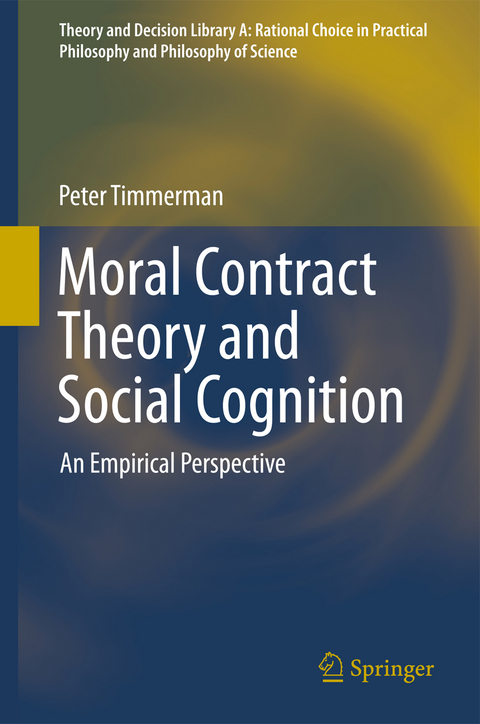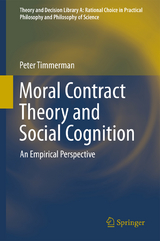Moral Contract Theory and Social Cognition
An Empirical Perspective
Seiten
2014
|
2014
Springer International Publishing (Verlag)
978-3-319-04261-9 (ISBN)
Springer International Publishing (Verlag)
978-3-319-04261-9 (ISBN)
This book reveals that certain crucial, yet controversial, assumptions of moral contract theory are in fact plausible in the light of empirical findings. Its novel approach resolves a number of key contingencies in contractarianism and contractualism.
This interdisciplinary work draws on research from psychology and behavioral economics to evaluate the plausibility of moral contract theory. In a compelling manner with implications for moral theory more broadly, the author's novel approach resolves a number of key contingencies in contractarianism and contractualism.
Acting in accordance with principles that we could all agree to under certain conditions requires that agents are capable of taking up the perspectives of others. Research in social and developmental psychology shows just how challenging this can be. The author discusses in detail what implications findings on perspective-taking have for contract theory. He concludes with cautious optimism that, despite our limitations, it lies within our power to become better at perspective-taking and to adopt a contractarian or contractualist mode of moral thinking. This does however require us to be much more attentive to the standpoints of others than we tend to be.
Contract theorists also assume that agents can be moved to comply with principles that would be the object of agreement, with some arguing they can be so moved out of their own interest. The book show that, in contrast to the suspicion of many philosophers, this idea is largely supported by research on the dynamics of trust and our ability to distinguish trustworthy from untrustworthy others. Bringing a welcome dose of realism to the debate on contract theory, the author shows the value of assessing moral theories from an empirical perspective.
This interdisciplinary work draws on research from psychology and behavioral economics to evaluate the plausibility of moral contract theory. In a compelling manner with implications for moral theory more broadly, the author's novel approach resolves a number of key contingencies in contractarianism and contractualism.
Acting in accordance with principles that we could all agree to under certain conditions requires that agents are capable of taking up the perspectives of others. Research in social and developmental psychology shows just how challenging this can be. The author discusses in detail what implications findings on perspective-taking have for contract theory. He concludes with cautious optimism that, despite our limitations, it lies within our power to become better at perspective-taking and to adopt a contractarian or contractualist mode of moral thinking. This does however require us to be much more attentive to the standpoints of others than we tend to be.
Contract theorists also assume that agents can be moved to comply with principles that would be the object of agreement, with some arguing they can be so moved out of their own interest. The book show that, in contrast to the suspicion of many philosophers, this idea is largely supported by research on the dynamics of trust and our ability to distinguish trustworthy from untrustworthy others. Bringing a welcome dose of realism to the debate on contract theory, the author shows the value of assessing moral theories from an empirical perspective.
Acknowledgements.- I Introduction.- 1 The Practicability Assumption.- 2 Contract Theory and Perspective-Taking.- 3 Perspective-Taking in Moral Judgment.- 4 Perspective-Taking Accuracy and the Contract Test.- 5 How to Use a Contract Test.- II The Translucency Assumption.- 6 Contract Theory and Translucency.- 7 Translucency and the Irrationality of Straightforward Maximization.- 8 Why Not Be an Opportunist?.- 9 When Constrained Maximization is Rational.- 10 Conclusions.- Appendix.- Index.
| Erscheint lt. Verlag | 26.3.2014 |
|---|---|
| Reihe/Serie | Theory and Decision Library A: |
| Zusatzinfo | X, 233 p. 7 illus. |
| Verlagsort | Cham |
| Sprache | englisch |
| Maße | 155 x 235 mm |
| Gewicht | 532 g |
| Themenwelt | Geisteswissenschaften ► Philosophie ► Allgemeines / Lexika |
| Geisteswissenschaften ► Philosophie ► Ethik | |
| Geisteswissenschaften ► Psychologie ► Arbeits- und Organisationspsychologie | |
| Schlagworte | Contract Theory and Perspective-Taking • Contract Theory and Translucency • David Gauthier • Detecting trustworthiness • Empirical plausibility • Golden opportunities • Judging trustworthiness on the basis of nonverbal • Judging trustworthiness on the basis of nonverbal information • lie detection • Limits of self-control • Moral contract theory • Moral Development • Perspective-Taking Accuracy and the Contract Test • Perspective-Taking in Moral Judgment • Practical advice for contractarian agents • Signs of trustworthiness • Third party judgments • T.M. Scanlon |
| ISBN-10 | 3-319-04261-0 / 3319042610 |
| ISBN-13 | 978-3-319-04261-9 / 9783319042619 |
| Zustand | Neuware |
| Haben Sie eine Frage zum Produkt? |
Mehr entdecken
aus dem Bereich
aus dem Bereich
die letzten Jahre der Philosophie und der Beginn einer neuen …
Buch | Hardcover (2024)
Klett-Cotta (Verlag)
CHF 39,20
Gesundheitsschutz, Selbstbestimmungsrechte, Rechtspolitik
Buch | Softcover (2024)
Kohlhammer (Verlag)
CHF 54,60
Jenseits von Identität | Ausgezeichnet mit dem Leipziger Buchpreis …
Buch | Softcover (2023)
Ullstein Taschenbuch Verlag
CHF 19,55




